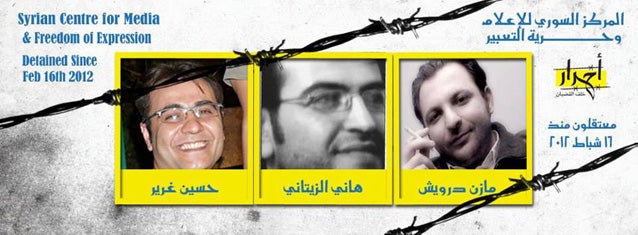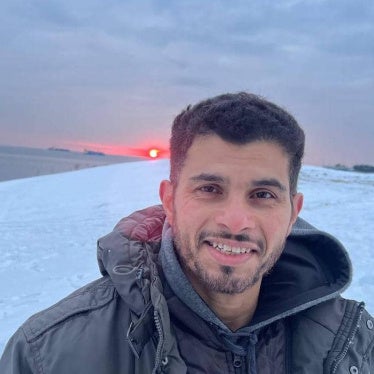Mazen Darwish is the president of the Damascus-based Syrian Centre for Media and Freedom of Expression (SCM), which he founded in 2004 to promote freedom of opinion and expression. In recent years, international organizations have showered awards on him for his advocacy: He received the 2011 Roland Berger Human Dignity Award; the 2012 Reporters Without Borders Press Freedom Prize; and the 2013 Bruno Kreisky Prize.
As crisis engulfed Syria in 2011, SCM and its staff worked to document serious and widespread human rights abuses with a view to contributing to a process leading to truth, justice, and reconciliation.
Plain-clothes Air Force Intelligence agents raided SCM’s office in Damascus on February 16, 2012 and arrested two visitors and all 14 staff members present. Officials released the visitors, and soon afterward, several staff members. The government tried seven staff members for “possession of illegal documents published with the aim of overthrowing the regime,” sentenced them to time served, and released them in mid-May 2012. Security agents then re-arrested one of this group, 26-year-old Ayham Ghazzoul, in November 2012. Shortly afterward,another detainee reported that he saw Ayham die from wounds that appeared to be from a beating in Military Intelligence Branch 215 in the Kafar Souseh section of Damascus.

The Air Force Intelligence held Mazen Darwish and four other staff members, Hussein Gharir, Hani Zaitani, Mansour Omari,and Abdul Rahman Hamada, incommunicado for several months. With total official silence on the fate of these men during that time, their families feared they had been killed. Instead, Air Force Intelligence agents tortured and mistreated them, others who were detained with them and then released told their families. Finally, officials moved them to Adra and allowed their families to visit.
On February 27, the five men were indicted for “publicizing terrorist acts” under article 8 of the Counterterrorism Law President Bashar al-Assad enacted in 2012.
The indictment, which Human Rights Watch reviewed, states that the government brought these charges because of the men’s activities as staff members of the organization. The illegal activities included monitoring online news by the Syrian opposition, publishing studies on human rights and media in Syria, documenting names of the detained, disappeared, wanted, and killed during the Syrian conflict, and receiving funding from Western organizations. The indictment states that an investigative judge in Damascus considered these actions to be part of an attempt to “stir the internal situation in Syria and so provoke international organizations to condemn Syria in international forums.”
If convicted, the men face prison terms of up to 15 years. Officials conditionally released two of the five, Mansour and Abdul Rahman,on February 6, 2013 pending trial, while Mazen remains in detention, along with Hussein and Hani.
“Mazen and I got married five months before he was arrested,” said Yara, Mazen’s wife. “I still cannot process everything that has happened: his arrest, his detention, our dreams shattered. How long will this nightmare last?” When officials finally allowed Yara to visit her husband in the Adra prison in Damascus in November 2012, she was alarmed to see how much weight he had lost. “I was so glad he was still alive. I had been haunted by the thought that the security forces might kill him in detention, while torturing him,” she said.
Hani and Sana, too, had married only five months before Hani’s detention. Agents of the security forces arrested Sana on the same day as her new husband, and officials did not tell her that they had also captured Hani. Officials released Sana two days later, when she learned the harsh news that her husband was missing. “His absence is excruciatingly painful,” she said.
When security agents detained Hussein, Mays, his wife of seven years, was left caring for their two sons, so young that now at ages 5 and 2 they barely remember their father when they visit him in detention. “When I took my child to see his father, he thought that was his uncle,” Mays said. “It was even harder on our older child, who had faint memories of his father but did not recognize him in prison.” After two visits, the older boy refused to go back to the prison. “He said he no longer wished to speak to his father through the window. He wanted to sit on his father’s lap, he wanted to take his father home, and he wanted his father to read books to him,” she said. “This is getting increasingly difficult for me, although I was soothed by the knowledge that he is alive.”
Other HRW work on this case: https://www.hrw.org/news/2013/05/17/syria-rights-activists-face-terrorism-charges; and https://www.hrw.org/news/2013/06/25/syria-counterterrorism-court-used-stifle-dissent.








